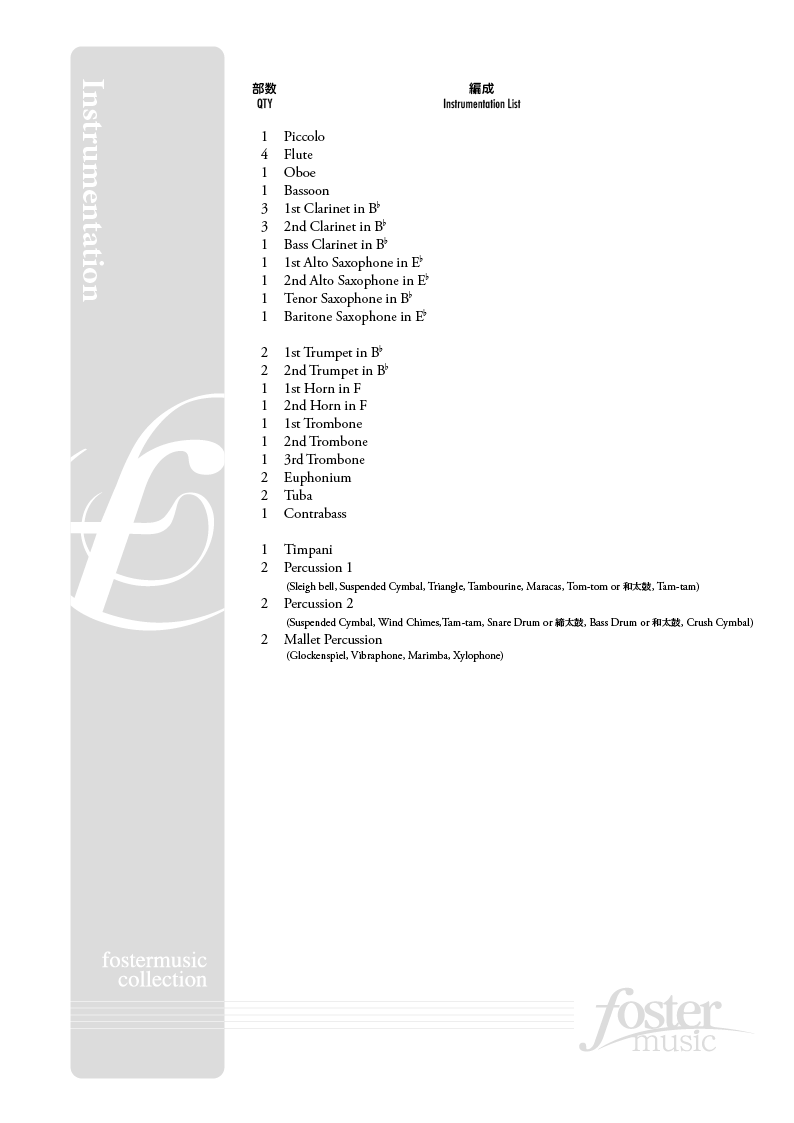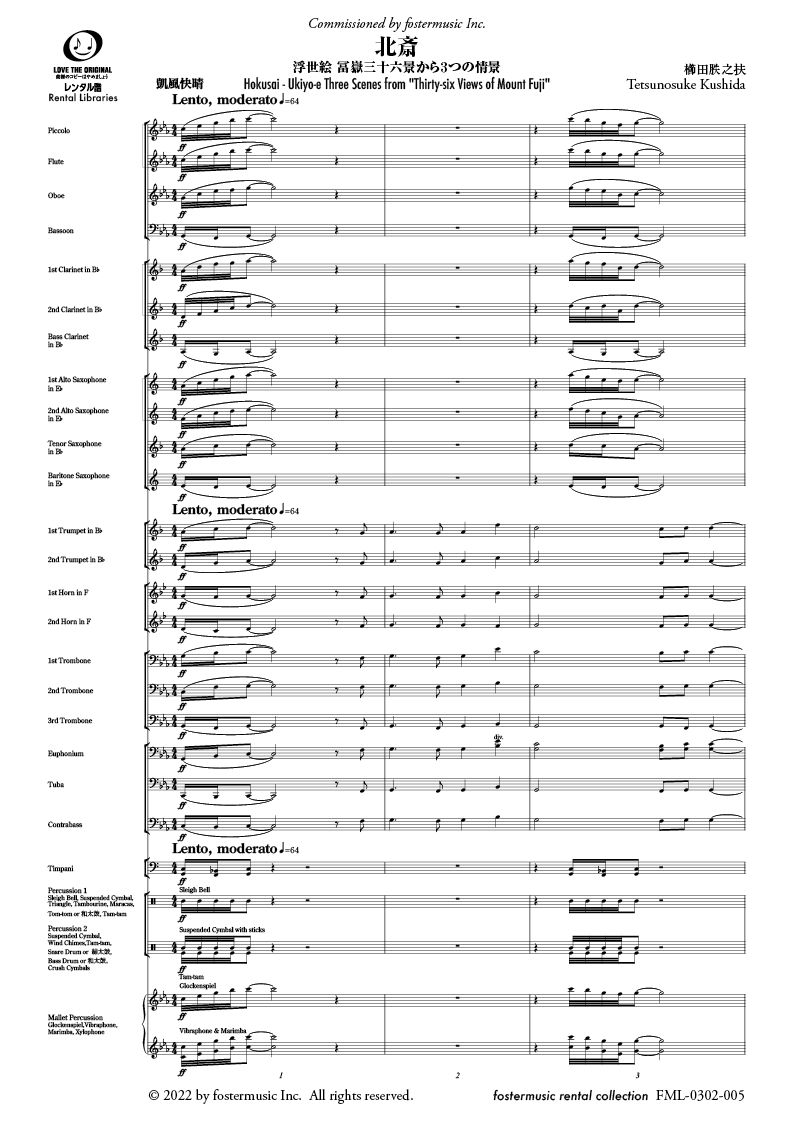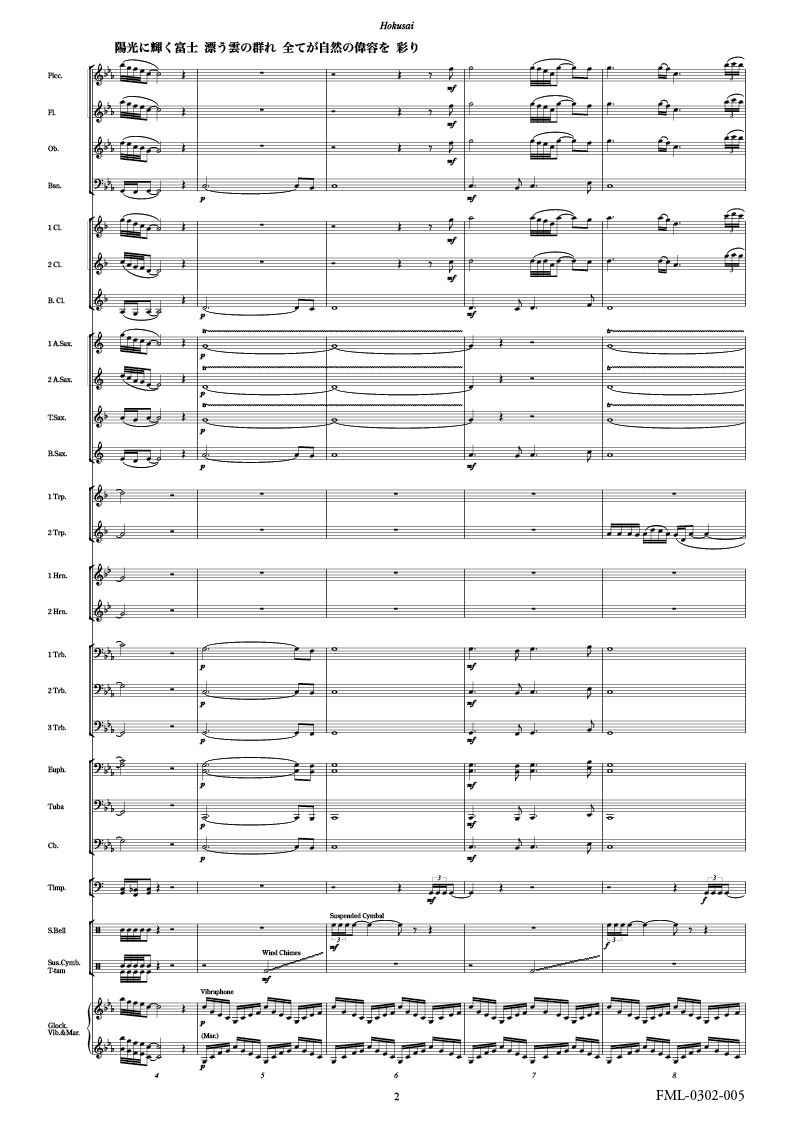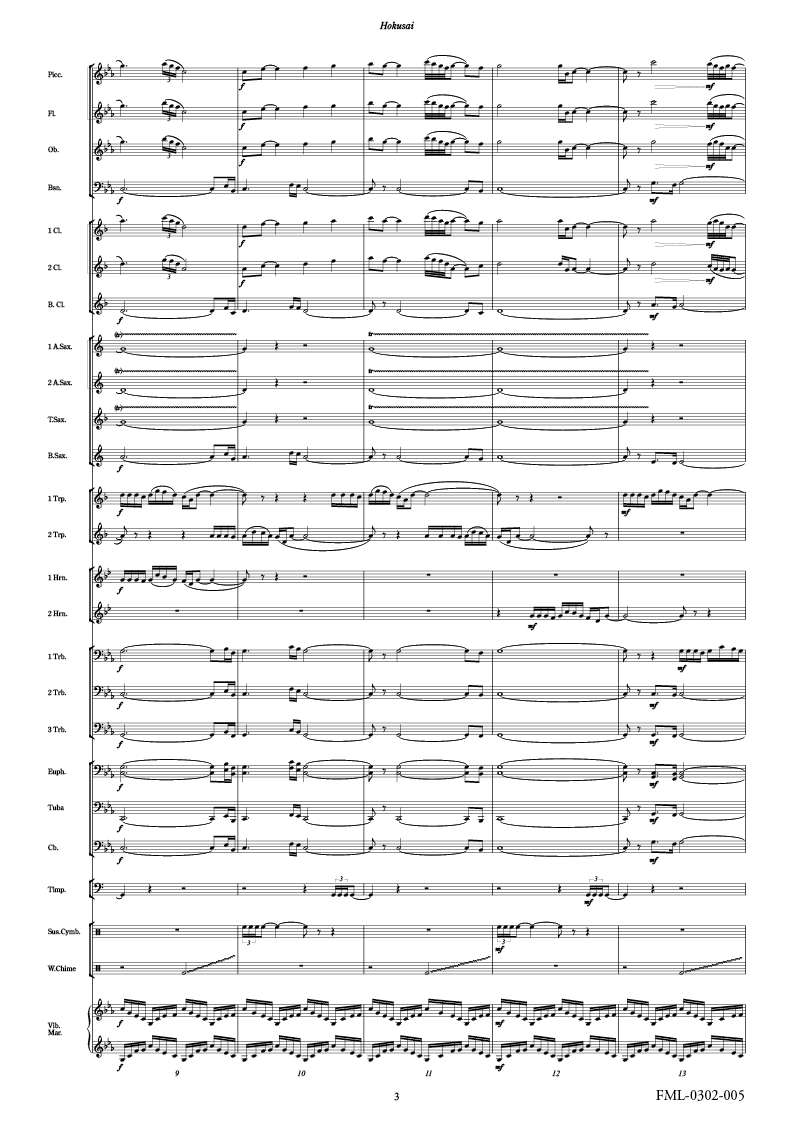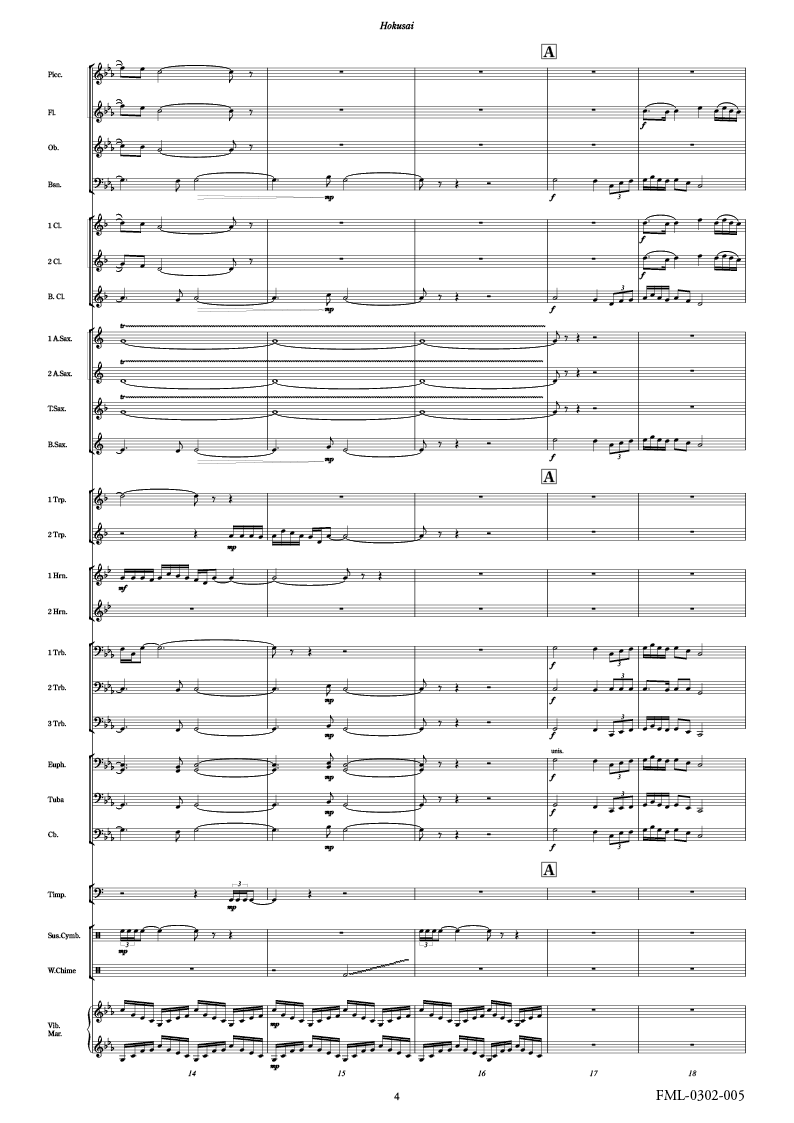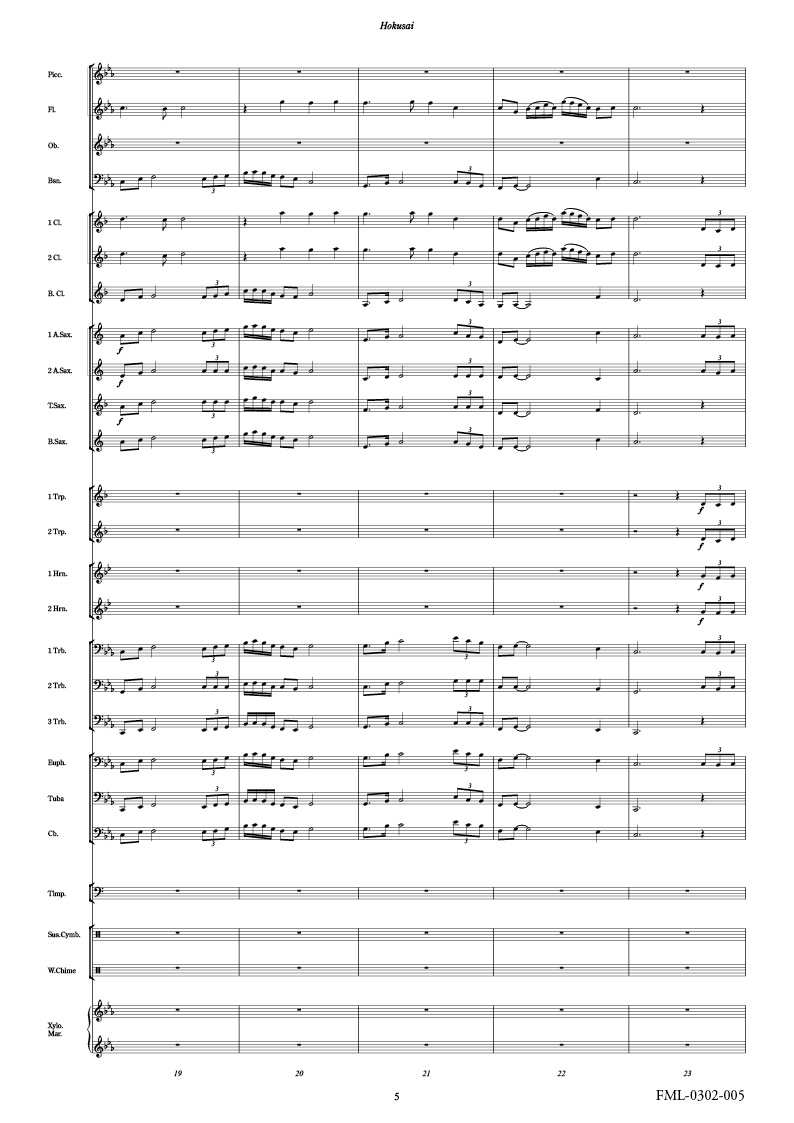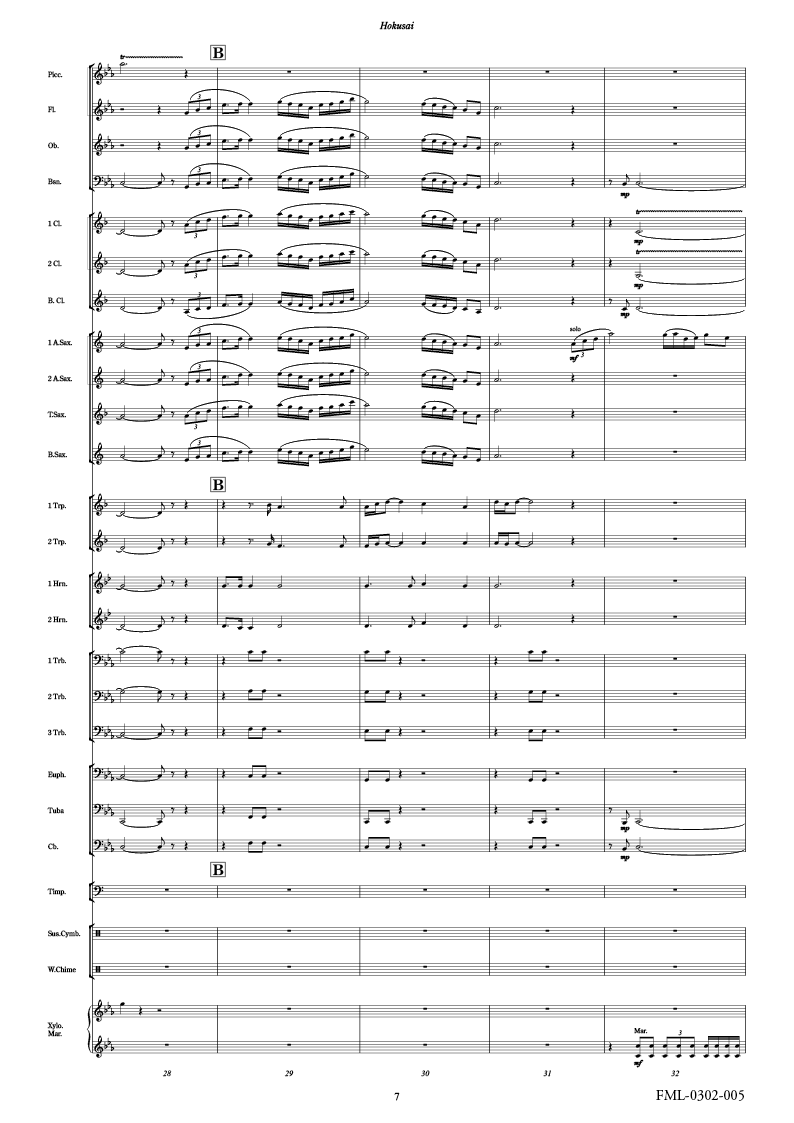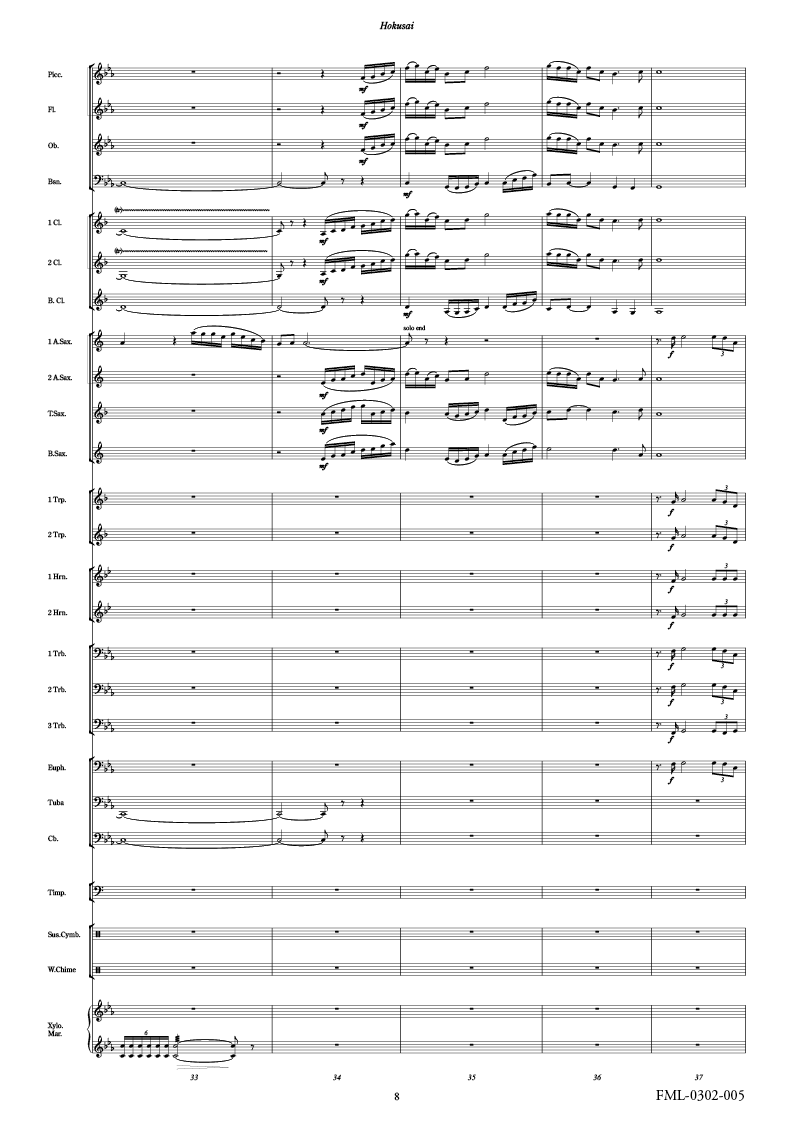- 概要
- 編成/曲目
- 補足
- ENGLISH
北斎~浮世絵 冨嶽三十六景から3つの情景
【楽曲解説】
葛飾北斎の「富嶽三十六景」の中から選んだ3枚の絵から、それぞれの印象を綴り構成した曲です。
葛飾北斎は、18・19世紀・江戸時代後期の浮世絵師として、きわめて一般の人々に愛されて、芸術作品としても、イラストとしての普及作品にもなっています。ゴッホを始め、西欧の印象派の誕生にも影響を与えたのは、その画風のオリジナリティが際立っていたからです。
日本人の感性を日本人が描く、という私にとっては、この北斎の絵を取り上げようとしたことは、極めて自然だと自分なりに感じています。その大胆な構図からは、現代的な刺激を受けるに充分で、日本の伝統音楽を自由に展開さすことが可能でした。
曲全体は、風景を印象的に描くという、解り易い構成をとっていますから、大編成のオーケストラ的な音量の設計も、少人数編成のウィンド・アンサンブルのための作品として仕上げることも可能です。
【演奏に際して】
「凱風快晴」では、赤い富士は朝焼けに染まった、というイメージでのファンタジーを描いてみました。大きな稜線が重なり、雲に包まれ、鳥の声も聞こえて来たり、といったメルヘンのバックグラウンドです。裾野を支える低音部、高音部の赤く染まった稜線、Sax.セクションのトリルとTrumpetで湧き上がる雲、鍵盤打楽器の光、全てを立体的に表現します。その中から雄大な富士の姿を描いて下さい。
「相州梅沢庄」は、幻想的な蒼い富士に鶴が優雅に舞います。新春の朝でしょう。清々しく飛び立つ鶴の姿を、美しいワルツで歌います。各パートともに、音色の美しさと淀みのない流れを求めましょう。リズムの刻みは、決して堅く・鋭くならないように、柔らかく旋律を包み込んで行きます。
ドビュッシーの「海」の楽譜表紙になった「神奈川沖浪裏」は、富士を飲み込むかように、高く激しく豪快に迫り来る怒濤、それに挑むかのような漁船。打楽器群は、乱れることなく挑みます。そこには、漕ぎ手の勇敢な力強さを感じさせます。打楽器アンサンブルの多彩さを求め和太鼓を加えることも可能です。遠くに見える富士の姿は、波浪に飲み込まれることなく、むしろ一体となった絵となって、大きく見えて来ます。木管アンサンブルで創り出す大きな浪を背景に、雄大な富士のコラールで終わります。(櫛田てつ之扶)
仕様
- アーティスト
- 作曲: 櫛田てつ之扶
- 演奏形態
- 吹奏楽
- 編成
- 中編成 / 27パート
- 演奏時間
- 0:09:10
- グレード
- 3+
- 主要ソロ
- Alto Saxophone, Bb Clarinet
- 商品カテゴリ
- レンタル譜/レンタル楽譜ご利用案内
- 出版社 / 品番
- フォスターミュージック / FML-0302
- 発売日(年)
- 2022/01/27
- キーワード
- オリジナル和風,
- 【スコア】北斎~浮世絵 冨嶽三十六景から3つの情景:櫛田てつ之扶 [吹奏楽スコア]
スタディスコア/セット・版違いなど
楽器編成
- 主要ソロ:Alto Saxophone, Bb Clarinet
- Piccolo
- Flute
- Oboe
- Bassoon
- Bb Clarinet 1
- Bb Clarinet 2
- Bass Clarinet
- Alto Saxophone 1
- Alto Saxophone 2
- Tenor Saxophone
- Baritone Saxophone
- Trumpet 1
- Trumpet 2
- Horn 1
- Horn 2
- Trombone 1
- Trombone 2
- Trombone 3
- Euphonium (div.)
- Tuba
- String Bass
- Timpani
- Percussion 1 (Sleigh bell, Sus.Cymbal, Tri., Tamb., Maracas, Tom-tom or 和太 , Tam-tam)
- Percussion 2 (Sus.Cymbal, W.Chimes,Tam-tam, S.D. or 締太 , B.D. or 和太 , C.Cymbal)
- Mallet Percussion
- (Glock., Vib., Mari., Xylo.)
- サイズ
- A4/3cm未満
HOKUSAI - UKIYO-E THREE SCENES FROM "THIRTY-SIX VIEWS OF MOUNT FUJI":Composer: Tetsunosuke KUSHIDA
This piece was inspired by my impressions of three paintings from Hokusai's "Thirtysix Views of Mount Fuji."
Hokusai was a popular and wellloved ukiyoe artist from the late Edo period (18th and 19th centuries), and his works are widely recognized by the general public. His style of painting was so distinctively original that it played an influential role in the birth of impressionism in Western Europe, including having an impact on the style of Van Gogh.
As a Japanese person myself, it feels highly natural for me to work with the Japanese aesthetic sensibility embodied by Hokusai's paintings. The bold composition of Hokusai's work was enough to offer me a modern inspiration with which I could freely develop the elements of traditional Japanese music.
This entire piece is structured in a straightforward manner in its portrayal of striking landscapes, so it can be performed by large orchestras by adjusting the acoustic elements accordingly, or by smaller wind ensembles.
"Fine Breezy Day" is a fantasy inspired by the image of a crimson Mt. Fuji suffused with the light of dawn. This is the land of fairy tales surrounded by clouds, large overlapping ridgelines, and birds chirping in the background. With the foot of the mountain depicted by the bass section, the reddish ridges by the treble section, the rising clouds by the trumpets and the trills of the saxophones, and the light by the keyboard and percussion, the result is a highly realistic tapestry with which the majestic figure of Mt. Fuji can be evoked.
In "Umezawa Hamletfields in Sagami Province," cranes dance gracefully over Mt. Fuji, which is doused in a magical blue hue on a morning in early spring. The beautiful waltz in this section depicts the cranes taking off elegantly. Each part should strive for a beautiful tone and an uninterrupted flow. The rhythmic beats should guide the melody delicately without being too firm or sharp.
"The Great Wave off Kanagawa," which had appeared on the cover of Debussy's "The Sea," depicts a high, raging wave surging fiercely and threatening to swallow up Mt. Fuji, alongside a fishing boat that appears to be taking on the wave. In this section, the percussion instruments converge into a unified front that symbolizes the rowers' courage and strength. Taiko drums can also be included for greater variety. The figure of Mt. Fuji in the distance gradually becomes one with the larger foreground instead of being swallowed up by the wave. The piece closes with a chorale extolling the magnificence of Mt. Fuji against the backdrop of the large wave represented by the woodwind ensemble.
Specifications
- ARTIST
- Composer: Tetsunosuke KUSHIDA
- INSTRUMENTATION
- Windband / 26-35 players
- DURATION
- 0:09:10
- GRADE
- 3+
- PRODUCT TYPE
- Set / RENTAL
- PUBLISHER / Code
- fostermusic Inc. / FML-0302
- RELEASE
- 2022/01/27
- OVERSEAS SHIPMENT
- Yes
- EUROPEAN PARTS
- Not Included
For foreign customers,
You can now purchase from overseas via WorldShopping BIZ.
Study scores, ensembles, and CDs can be ordered directly from our website.
Rental sheet music and some other items are not covered by this cart system, so please contact us by email.
ca7i4c6gols8
〈2月〉会員限定クーポン
対象カテゴリ
- 国内出版社 > フォスターミュージック
会員限定
¥1,000 OFF
残発行枚数:82
下限金額:¥5,500
有効期間:2025/02/01 ~ 2025/02/28
dpuzw8qdsrw4
サクソフォン関連商品全品5%OFF
対象カテゴリ
- アンサンブル・ソロ > サクソフォン
会員限定
5 % OFF
残発行枚数:95
下限金額:¥3,000
有効期間:2025/02/01 ~ 2025/03/02
7swpfiq42pog
選曲応援!CD《80%OFF》クーポン
対象商品
- コンクール自由曲ベストアルバム4 「歌劇『カルメン』」:海上自衛隊東京音楽隊 [吹奏楽CD]
- コンクール自由曲ベストアルバム7「想ひ麗し浄瑠璃姫の雫」:土気シビックウインドオーケストラ [吹奏楽CD]
- コンクール自由曲ベストアルバム6「無辜の祈り」:海上自衛隊東京音楽隊 [吹奏楽CD]
- コンクール自由曲ベストアルバム12「メトロポリス」:土気シビックウインドオーケストラ [吹奏楽CD]
- コンクール自由曲ベストアルバム11「虹色アンダーカレント」:土気シビックウインドオーケストラ [吹奏楽CD]
- コンクール自由曲ベストアルバム10「とこしえの声」:土気シビックウインドオーケストラ [吹奏楽CD]
- コンクール自由曲ベストアルバム9「銀河鉄道の夜」:土気シビックウインドオーケストラ [吹奏楽CD]
- コンクール自由曲ベストアルバム8「天満月の夜に浮かぶオイサの恋」:土気シビックウインドオーケストラ [吹奏楽CD]
- 20人のコンクールレパートリーVol.5 「風姿花伝」:土気シビックウインドオーケストラ [吹奏楽CD]
- 20人のコンクールレパートリーVol.4 「ちはやふる」:土気シビックウインドオーケストラ [吹奏楽CD]
- 20人のコンクールレパートリーVol.3 「華の伽羅奢」:土気シビックウインドオーケストラ [吹奏楽CD]
- 20人のコンクールレパートリーVol.2 「雲海の詩」:土気シビックウインドオーケストラ [吹奏楽CD]
- 樽屋雅徳作品集Vol.2「輪廻の八魂(やつだま)」:土気シビックウインドオーケストラ [吹奏楽CD]
- 樽屋雅徳作品集Vol.1「月下に浮かぶひとすじの道標」:土気シビックウインドオーケストラ [吹奏楽CD]
- 福島弘和 音楽と語りのための作品集 Vol.2「ごんぎつね」:土気シビックウインドオーケストラ [吹奏楽CD]
- 福島弘和 音楽と語りのための作品集 Vol.1「注文の多い料理店」:土気シビックウインドオーケストラ [吹奏楽CD]
- フォスターミュージック作品集「サウンド・オブ・ミュージック」:土気シビックウインドオーケストラ [吹奏楽CD]
- ザ・ジョイフルブラス・スタンダード・コレクション:ザ・ジョイフルブラス [金管CD]
80 % OFF
残発行枚数:88
下限金額:¥1,100
有効期間:2024/12/27 ~ 2025/03/31

![北斎~浮世絵 冨嶽三十六景から3つの情景:櫛田てつ之扶 [吹奏楽中編成-レンタル譜]](/html/upload/save_image/FML0302_1.png)
